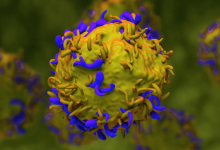How Much Testing is Enough? Save

I saw a patient this past week with new onset polyarthralgia. This led me to ponder how my fellow rheumatologists would utilize laboratory testing in such a patient.
She was a 36 yr. old white female with no signficant past medical history. She was only taking OTC naproxen for joint pains in her hands only that began 10 weeks ago. She has 20 minutes or AM stiffness. She has no family history of arthritis. Denies systemic features, never been pregnant and denies trauma, travel or new medications.
On exam she only has tenderness over 2-3 MCPs and PIPs bilaterally - TJC = 5; SJC =0.
There is no synovitis, enthesitis, tender points, skin or nail findings. (I know you want more information, but that won't make you smarter here.)
The question is: What Testing Would You Do?
I posed this question to Twitter, and within 24 hours had 107 responses (I have reasonable evidence that most of these respondents are rheumatologists). See below.

The results indicate that most of you "want it your way" - now, a complete battery of acute phase reactants and serologies so that you can answer the patient next time when she asks, "Doc...what did the lab test show and what do I have".
I must be a simpleton or a nihilist but for me the only indicated labs were a CBC, CMP, CRP and ESR.
More than half of rheumatologists chose the shotgun approach and ordered as many labs as was offered. I think this is faulty practice, cost inefficient and in disregard of the facts in evidence. Although she may have symmetric polyarthralgias, she does not have synovitis, enthesitis or other features that would lead you to diagnose her as either rheumatoid arthritis or lupus.
If her ANA or CCP come back positive - does she have RA or Lupus? Obviously not. She also doesn't meet any definition of preclinical disease either.
Ive been entrusted to write the chapter on "evaluating musculoskeletal complaints" in Harrisons Textbooks of Internal Medicine since 1987. So I've had to think, research and write on this subject for a long, long time. (https://buff.ly/2vEnGB2)
Here are some principals that lead me to think my fellow rheumatologists are nuts or not thinking:
- There is no rush to make a diagnosis here. While the goal is an early and accurate diagnosis, this is not always possible at the first few encounters. Moreover, most MSK complaints are self-limited and may only require symptomatic therapy.and time to resolve.
- The clinician should avoid the temptation to use screening tests or batteries of rheumatic panels as an aid to diagnosis. Indiscriminate testing is expensive and often yields results with low predictive value.
- The utility and predictive value of rheumatic tests are disappointingly low when the pretest probability of an anticipated diagnosis is low.
- Primary indications for further serologic testing would include systemic features (e.g., fever, rash), neurologic manifestations, inflammatory joint findings (exam or arthrocentesis), or chronic symptoms that are undiagnosed after an initial evaluation, symptomatic therapy, and observation over time (> 6 weeks).
- If you make a big deal out of labs, then the patient thinks it's the labs that diagnose her and not you. See my former blog - Why patients believe their labs more than their doctors.
Am I wrong here? Must I repeat my fellowship to relearn such bad habits?










If you are a health practitioner, you may Login/Register to comment.
Due to the nature of these comment forums, only health practitioners are allowed to comment at this time.